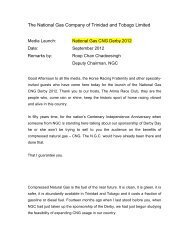June 2012 ISSN 2070-4593 - NGC
June 2012 ISSN 2070-4593 - NGC
June 2012 ISSN 2070-4593 - NGC
You also want an ePaper? Increase the reach of your titles
YUMPU automatically turns print PDFs into web optimized ePapers that Google loves.
Linkin Park and Music for Relief to Bring Solar Power to<br />
Uganda Health Clinics<br />
Building on its Power the World initiative to bring solar lights to homes in Haiti,<br />
the Grammy-Award winning band Linkin Park has launched a new campaign<br />
to bring solar power to health clinics in Uganda and encouraging fans to sign<br />
a pledge to support Sustainable Energy For All.<br />
With 1.3 billion people living without access to electricity, health care in<br />
energy-poor regions is severely compromised. Clinics and hospitals often<br />
function in the dark at night, or close their doors. Among those most affected<br />
are mothers in need of emergency obstetric care and their newborns. Most<br />
energy-poor regions, including Uganda, are at a crisis point in maternal and<br />
neonatal mortality.<br />
To bring solar power to health clinics in Uganda, LinkinPark, through their non-profit<br />
organization Music for Relief, is working with We Care Solar, a nonprofit that designs and<br />
manufactures the Solar Suitcase, a high-efficiency solar energy system that fits in a carryon<br />
suitcase. Designed for medical settings, the Solar Suitcase provides health workers with<br />
reliable lighting, mobile communication devices and power for medical devices. The suitcase is<br />
now used in 17 countries, including Uganda. Linkin Park will be featuring the Solar Suitcase at<br />
upcoming concerts.<br />
“The dark is no place to practice medicine,” said LinkinPark lead vocalist Mike Shinoda. “It’s<br />
unimaginable to think of a mother delivering in the dark, or having a C-section by the light of<br />
a cell phone, but that’s what’s happening. Solar power enables health workers to do the work<br />
they were trained to do. It allows women and babies to get the care they need...and survive<br />
childbirth.”<br />
Reliable electricity is an often-overlooked intervention in the fight to reduce maternal<br />
mortality, said We Care Solar co-founder Dr. Laura Stachel, an obstetrician who since 2008 has<br />
researched maternal mortality in Africa. “Improved training, equipment, and medical supplies<br />
are all necessary to reduce maternal mortality,” said Dr. Stachel. “But health care workers can’t<br />
take full advantage of these interventions without reliable power.” She added, “Without power<br />
and light at night, mothers are dying from obstetric complications that are routinely treated in<br />
the United States.”<br />
If the world temperature rises by more<br />
that 1.5 degree Celsius the Caribbean’s<br />
low-lying counties and small island<br />
states will be at serious risk of economic<br />
hardship, poor health, and environmental<br />
degradation from rising sea levels, severe<br />
weather, coastal erosion and coral and sea<br />
life deterioration.<br />
Caribbean Community Climate Change<br />
<strong>June</strong> <strong>2012</strong> Earth Conscious 27









